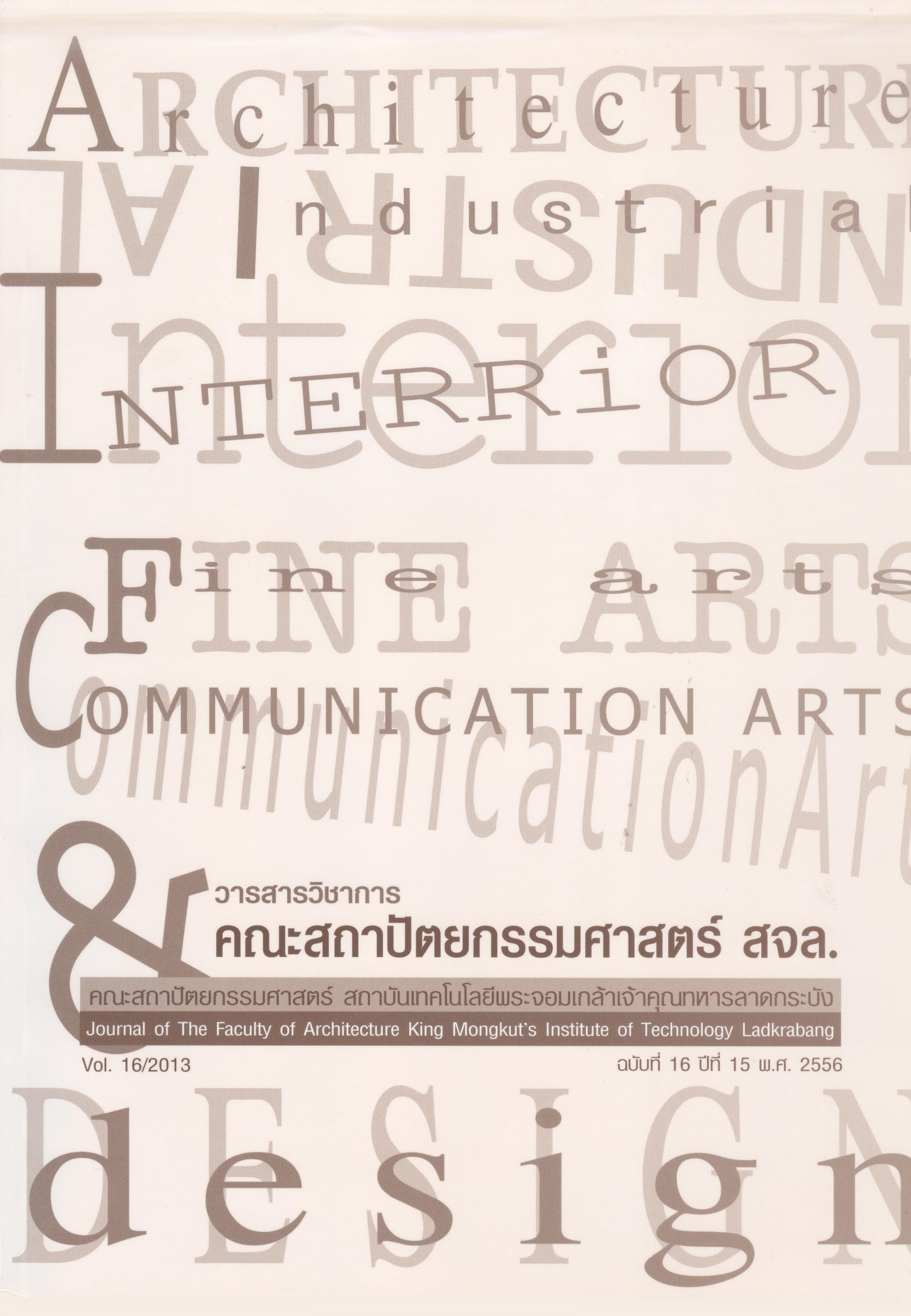ความสำคัญของกระบวนการเรียนรู้ต่อการฟื้นฟูชุมชน: กรณีศึกษาชุมชนริมน้ำจันทบูร (The Significances of Learning Process of Community Revitalization, Case Study: Chanthaboon Waterfront Community, Chanthaburi Province)
Main Article Content
Abstract
บทคัดย่อ
ชุมชนริมน้ำจันทบูร เป็นชุมชนเก่าแก่มีประวัติศาสตร์ยาวนานกว่า 300 ปี เดิมเป็นศูนย์กลางการค้าลาการปกครองของจังหวัด จึงมีความเจริญรุ่งเรืองและมีความหลากหลายทางวัฒนธรรมทั้งไทย จีน ญวน แต่เมื่อเกิดการเปลี่ยนแปลงทางคมนาคมจากทางน้ำเป็นทางบก ชุมชนจึงไม่เหลือบทบาทศูนย์กลางที่สำคัญ สภาพกายภาพชุมชนทรุดโทรม และผู้คนออกนอกพื้นที่จนมาถึงปัจจุบัน ปัจจุบันการอนุรักษ์ฟื้นฟูชุมชน ให้กลับมาคึกคักและมีชีวิตชีวาอีกครั้งหนึ่ง ซึ่งเป็นทางรอดของชุมชนเก่าหลายแห่งทั่วประเทศ แต่ที่ผ่านมาการอนุรักษ์ฟื้นฟูนั้นยังไม่ประสบผลสำเร็จเท่าที่ควร เพราะชาวชุมชนขาดความรู้ ความเข้าใจในการทำงานและคุณค่าที่แท้จริงของชุมชน รวมทั้งยังขาดกระบวนการมีส่วนร่วมในการทำงาน จากปัญหาดังกล่าว ผู้วิจัยจึงเข้าไปทำงานวิจัยเชิงปฏิบัติการแบบมีส่วนร่วม ( Participatory Action Research) ด้วยการทำกิจกรรมฟื้นฟูชุมชนกับชาวชุมชนริมน้ำจันทบูร จ.จันทบุรี โดยการนำการมีส่วนร่วมในทุกขั้นตอนของกิจกรรม ทำให้เกิดกระบวนการเรียนรู้ระหว่างการทำงาน ในกลุ่มแกนนำชุมชน ผู้รู้ในชุมชน เยาวชนจากโรงเรียนใกล้เคียง องค์กรปกครองท้องถิ่น และสำนักงานพาณิชย์จังหวัดที่ให้งบประมาณสนับสนุน วัตถุประสงค์ของงานวิจัย คือ เพื่อศึกษาวิเคราะห์หาปัจจัยสำคัญที่ช่วยส่งเสริมกระบวนการเรียนรู้ของชุมชนซึ่งนำไปใช้ในการฟื้นฟูชุมชนเก่าอย่างยั่งยืน
ผลการวิจัย สรุปเป็นประเด็น ดังนี้
1. การสร้างกระบวนการเรียนรู้ในกิจกรรมการฟื้นฟูชุมชนมีปัจจัยของการเรียนรู้ 4 ประการ คือ (1) กระบวนการคิด และจินตนาการ (2) องค์กร และชุมชนแห่งการเรียนรู้ (3) กระบวนการแลกเปลี่ยนเรียนรู้ และการจัดการ และ (4) บรรยากาศแห่งการเรียนรู้ ซึ่งจะทำให้ชุมชนเกิดการเรียนรู้ได้
2. ผลของการเรียนรู้ทำให้ชุมชนมีความเข้าใจและเข้มแข็ง คือ ชุมชนสามารถแก้ปัญหาได้ด้วยตนเอง และเกิดการเปลี่ยนแปลงทางความคิดและการกระทำของชาวชุมชน เช่น มีความภาคภูมิใจในชุมชน เข้าใจการฟื้นฟูและพัฒนา กำหนดทิศทางและเป้าหมายการทำงานของตนเอง เข้ามามีส่วนร่วมในการแก้ไขปัญหาได้
คำสำคัญ: การฟื้นฟูชุมชนเก่า ชุมชนริมน้ำ กระบวนการเรียนรู้
Abstract
Chanthaboon riverfront community is an old, long historical one which can be dated back over 300 years. It was used to be a center of commerce and administration of the province. Therefore, it had flourished and culture diversity among Thai, Chinese and Vietnamese. But change in transportation means from river way to land road, the community lose its center role. Physical of the community gradually rotten and people have evacuated until the day before the revitalization and rehabilitation.
Currently, community conservative revitalization is the vital way to survive many old communities throughout the country. But, previous revitalization process has not yet fully succeeded due to community itself lacks of knowledge and understanding in working and realizing community value, including no participatory process in working.
Due to this problem, the researcher took participatory action research through various revitalization activities with people in Chanthaboon waterfront, Chanthaburi Province. By conducting the participation to every step of activity generated learning process to community leaders, scholars, juvenile from vicinity schools, local organization and provincial office of commerce, the financial supporter. Target of the research is to analytical study the problematic factors assisting in community learning process which usable to revitalize old community, sustainably. The result of this research concludes as follows:
1. To create the revitalization learning process needs 4 components; (1) thinking process and imagination (2) organization and learning based society (3) process of knowledge exchange and operation and (4) atmosphere of learning to enlighten community.
2. The result of this learning makes the community more understanding and strength. The community itself can solve the problems. Changes in thinking and acting such as having self-esteem, clearly understood between revitalization and development. The community itself can set direction and target in working and together involve in problem solution.
Keywords: Revitalization Riverfront Community Learning Process
Article Details
This work is licensed under a Creative Commons Attribution-NonCommercial-ShareAlike 4.0 International License.
Copyright Transfer Statement
The copyright of this article is transferred to Journal of The Faculty of Architecture King Mongkut's Institute of Technology Ladkrabang with effect if and when the article is accepted for publication. The copyright transfer covers the exclusive right to reproduce and distribute the article, including reprints, translations, photographic reproductions, electronic form (offline, online) or any other reproductions of similar nature.
The author warrants that this contribution is original and that he/she has full power to make this grant. The author signs for and accepts responsibility for releasing this material on behalf of any and all co-authors.


